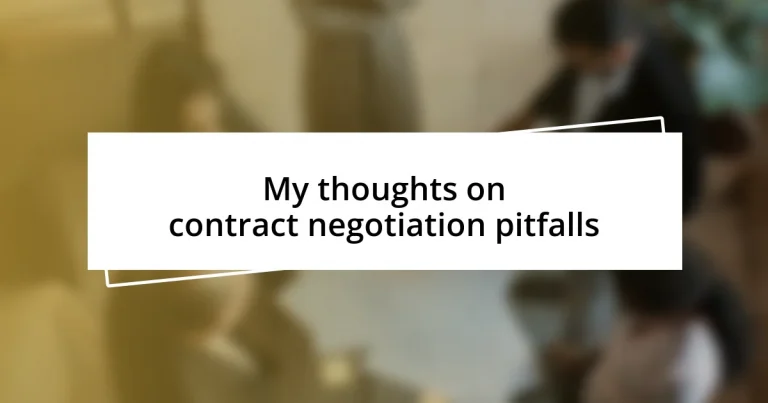Key takeaways:
- Preparation is crucial; understanding the other party’s needs leads to more favorable outcomes.
- Clear communication and defining terms help avoid misunderstandings and ensure all parties are aligned.
- Flexibility and a problem-solving mindset can turn challenges into opportunities for mutual benefit.
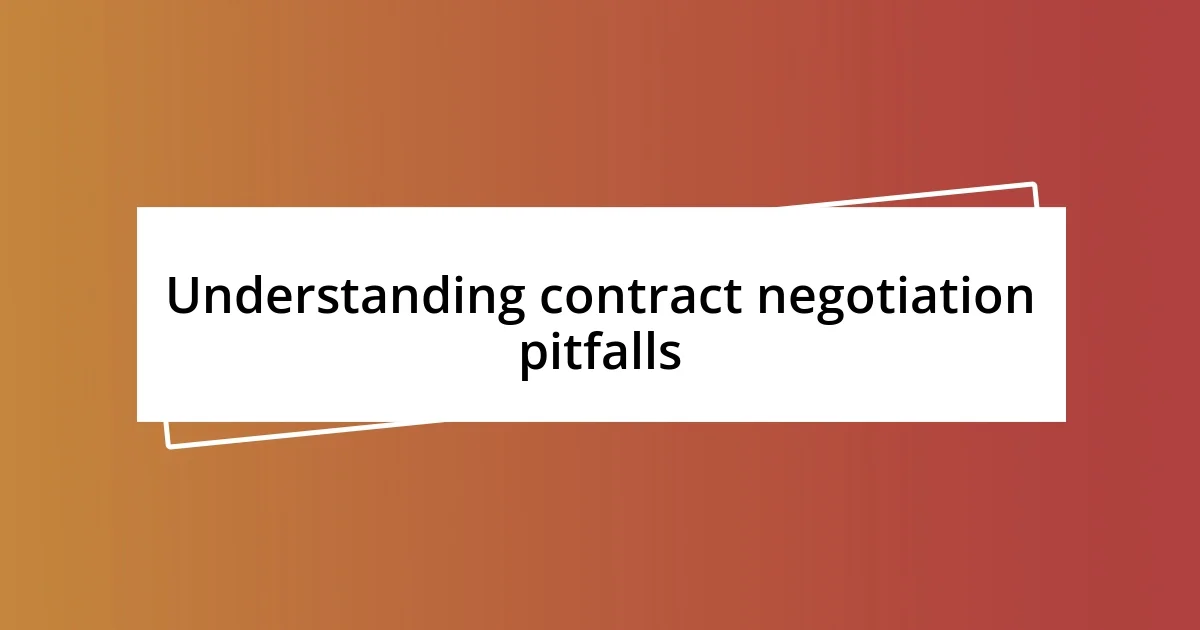
Understanding contract negotiation pitfalls
Understanding contract negotiation pitfalls can be complex, and I’ve certainly learned that the hard way. In my early experiences, I sometimes overlooked the importance of clearly defining terms. Remember the time I assumed everyone was on the same page about a deadline? It turned into a costly oversight for all involved.
One major pitfall is not researching the other party adequately. I once dove headfirst into negotiations with a company whose values clashed with ours. This lack of understanding led to a strained relationship and ultimately a contract that didn’t serve either side well. How often do we assume that a shiny reputation guarantees a solid partnership?
Another common trap is negotiating under pressure, which I’ve done more times than I care to admit. It’s easy to let emotions guide you when deadlines loom. There’s a delicate balance between urgency and thoroughness. Have you ever hastily agreed to terms, only to regret it later? I certainly have! Taking a breath and stepping back can shift the trajectory of an entire negotiation.
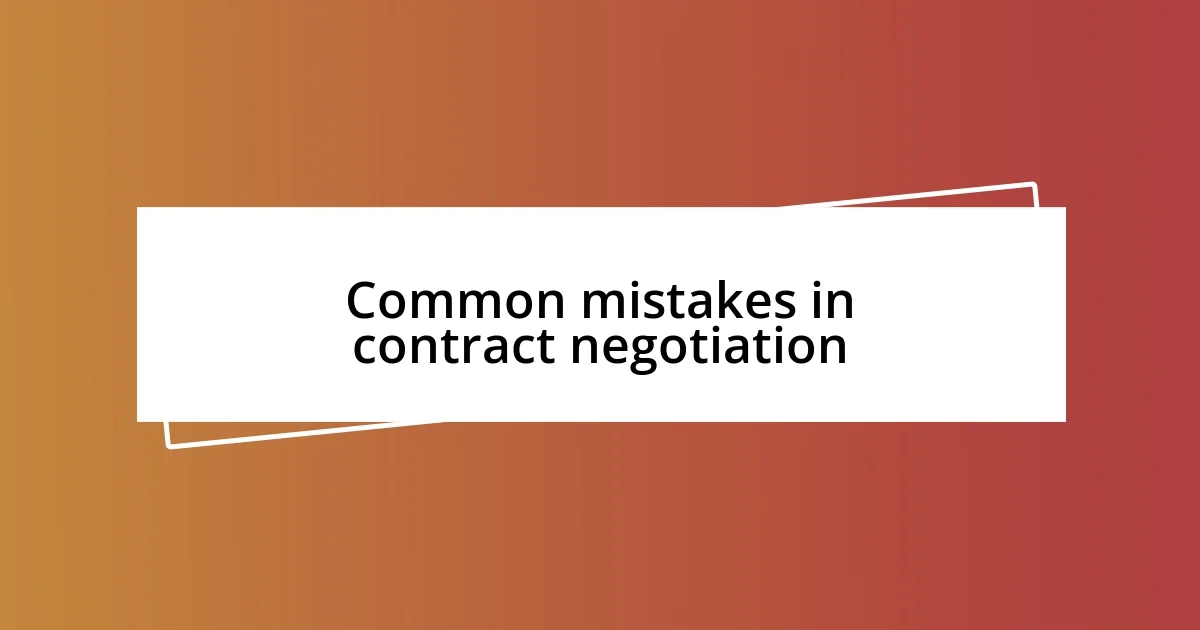
Common mistakes in contract negotiation
One of the most common mistakes I’ve encountered in contract negotiations is failing to clarify the fine print. I recall a time when I skimmed through a lengthy document, thinking the main points were all that mattered. Later, I discovered hidden fees and obligations that turned a favorable deal into a financial burden. It was a tough lesson in the importance of reading every detail and asking questions.
Here are some critical pitfalls to watch for:
- Neglecting to outline responsibilities and deliverables clearly.
- Assuming verbal agreements hold the same weight as written ones.
- Focusing too much on getting a deal done rather than meeting everyone’s needs.
- Allowing emotions to cloud judgment during crucial conversations.
- Ignoring potential future changes in circumstances or market conditions.
It’s a balancing act, really. Each of these mistakes has its roots in misunderstanding or rushing the process. Take a moment to reflect—what key details have you overlooked in your own negotiations?
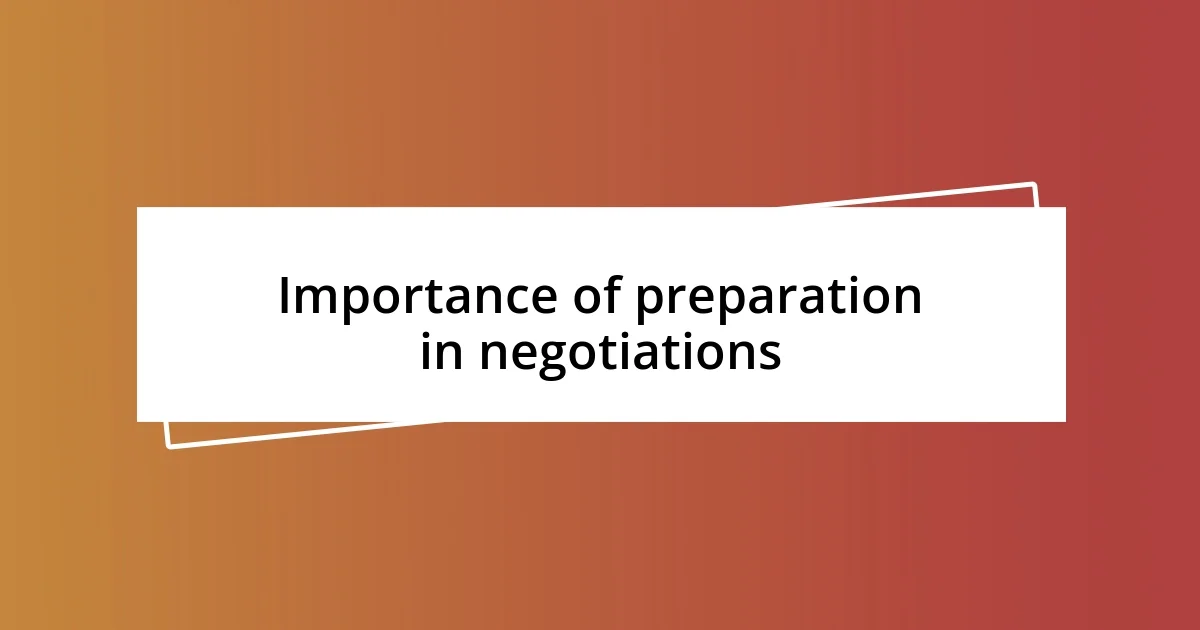
Importance of preparation in negotiations
Preparation can make or break a negotiation. I recall a time when meticulous prep turned a challenging discussion into a successful collaboration. Knowing the other party’s needs and motivations laid the groundwork for a productive exchange. Imagine walking into a room with confidence because you’ve done your homework—how empowering is that?
When I’ve faced negotiations without adequate preparation, I often felt myself scrambling for answers. It’s nerve-wracking to find yourself stuck without essential information, floundering when it could have been avoided. My experience teaches me that taking time to gather data about the other party—like their past contracts or business objectives—can lead to a more favorable outcome. It’s astonishing how a little preparation can uncover opportunities for mutual gain.
I’ve also learned that preparation extends beyond just knowing the facts. It involves strategizing and anticipating potential objections too. I can still vividly recall a tense exchange where I had foreseen a hurdle and came prepared with counterarguments and alternatives. That foresight saved not only the deal but also the relationship with the other party. So, ask yourself: are you equipping yourself adequately when entering negotiations?
| With Preparation | Without Preparation |
|---|---|
| Confidence in discussions | Feeling anxious and unprepared |
| Clear strategy and goals | Reacting to the other party’s demands |
| Better understanding of needs | Difficulty identifying common ground |
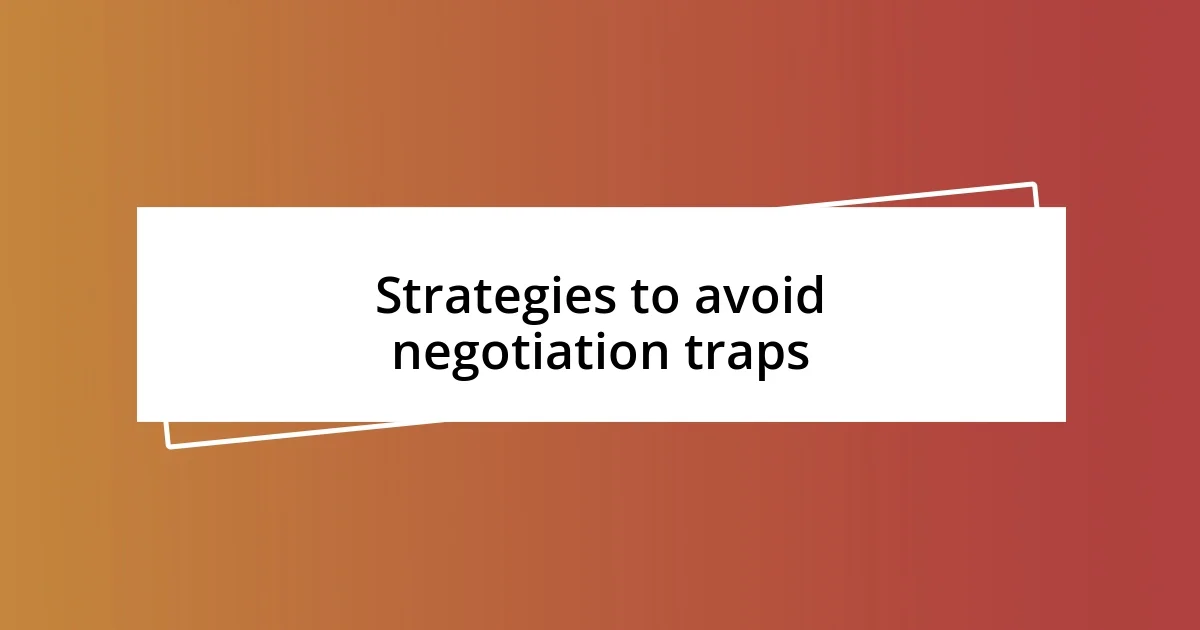
Strategies to avoid negotiation traps
To steer clear of negotiation traps, one essential strategy is fostering open communication. I’ve found that encouraging candid discussions often reveals hidden concerns and fosters trust. For instance, during a tense negotiation with a vendor, I initiated a casual chat about each other’s expectations. This simple step transformed our negotiation into a collaborative conversation rather than an adversarial standoff. Have you considered how your approach to communication shapes negotiation outcomes?
Another key tactic is establishing a clear outline of your goals and priorities before entering the negotiation room. In my experience, being crystal clear about what I wanted helped me avoid unnecessary concessions later on. During one significant contract discussion, I created a priority list, identifying non-negotiables versus areas where I could show flexibility. This clarity allowed me to navigate the conversation effectively and ultimately secure a deal that aligned closely with my objectives. I wonder how having a defined roadmap for your goals could change your negotiations.
Finally, embracing a mindset of problem-solving rather than combative negotiating can be a game-changer. Instead of viewing the other party as an opponent, I’ve learned to see them as a partner in finding mutually beneficial solutions. This shift in perspective helped me during a particularly challenging negotiation where we faced major differences. By focusing on collaborative brainstorming rather than sticking rigidly to our original positions, we arrived at a creative solution that satisfied both parties. Have you tried flipping your perspective in negotiations? It might just open new doors.

How to handle difficult negotiations
Difficult negotiations can be pretty daunting, but I’ve found that maintaining composure is crucial. In a particularly heated discussion over a partnership agreement, I took a moment to breathe and remind myself that getting defensive wouldn’t help. Instead, I focused on listening actively to the other party’s concerns, which ultimately fostered a more productive dialogue. Have you ever noticed how a calm demeanor can shift the energy in the room?
Another method that works wonders for me is to reframe objections as opportunities for clarification. During a tough negotiation about pricing, I encountered several pushbacks on my initial offer. Rather than feeling discouraged, I used their questions to uncover what they truly valued. This not only provided insight into their needs but also allowed me to propose creative solutions that satisfied both sides. Isn’t it fascinating how challenges can become gateways to better understanding?
Lastly, it’s also important to know when to take a step back and reassess. I recall a situation where things were stalled and tempers flared—a classic deadlock. In that moment, I suggested a short break. That pause allowed everyone involved to gather their thoughts and return with fresh perspectives. Sometimes, a little distance can do wonders for clarity. Have you ever found that a break transformed a negotiation for you?

Best practices for successful outcomes
Understanding the importance of flexibility during negotiations has proven invaluable in my experience. Once, during a crucial project deal, I approached the table with a rigid perspective. As the conversation unfolded, it became clear that sticking too closely to my original terms was counterproductive. By allowing myself to adapt and explore alternative offers, I ultimately found a path that satisfied both parties. How often do we cling to our first instinct instead of exploring more innovative solutions?
Equally vital is the practice of thorough preparation. In one instance, I entered a negotiation without adequately reviewing the other party’s history and previous agreements. This oversight left me vulnerable to unexpected counteroffers. However, after that experience, I committed to researching my counterparts. Knowing their past behaviors and values has since enabled me to craft proposals that resonate better with their priorities. Have you ever underestimated the power of prep work?
Lastly, celebrating small wins during negotiations keeps morale high and helps build a sense of progress. In a recent contract renewal, after reaching an agreement on delivery timelines, I took a moment to acknowledge this achievement. This gesture not only lightened the mood but also reinforced collaborative energy towards the remaining terms. Have you considered how recognizing success along the journey can propel you toward favorable outcomes?
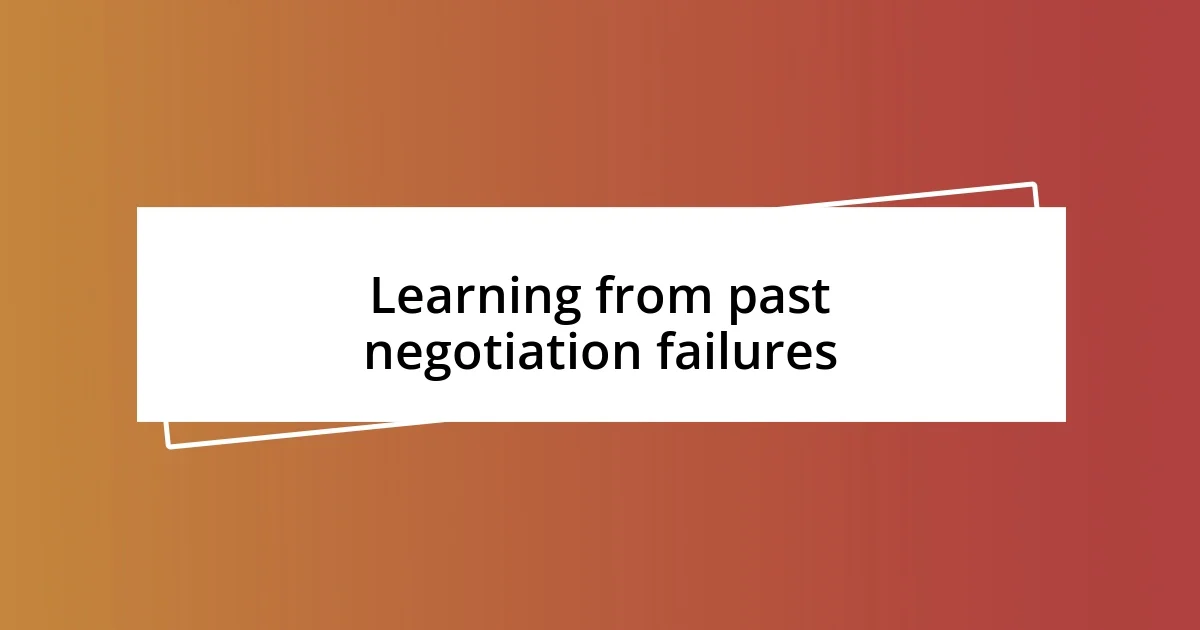
Learning from past negotiation failures
As I reflect on past negotiation failures, it’s striking how much I’ve learned from my missteps. For instance, there was a time when I entered a negotiation without fully understanding the other party’s priorities. I remember feeling frustrated when my initial offer was met with silence. That experience taught me the vital lesson of aligning my proposals with their core interests. Have you ever walked into a conversation completely unprepared, only to realize you missed the mark?
Another moment that stands out is when I got too emotionally involved in the discussion. In one instance, I lost sight of the objective, focusing more on being right rather than finding common ground. The tension escalated, and I realized later that this approach had alienated the other party. From that experience, I understood the importance of staying objective and recognizing when my emotions were clouding my judgment. How often do we let our feelings dictate the tone of negotiations?
Lastly, I’ve learned the hard way that failing to clarify terms can lead to significant misunderstandings. Once, I assumed we were on the same page about deliverables, but when the project unfolded, it became clear we had different expectations. That oversight resulted in delays and frustration. This experience reinforced my belief that thorough communication and establishing clarity from the outset is non-negotiable. Have you experienced similar instances where clarity could have avoided headaches?












